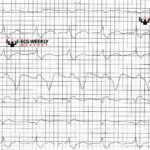ECG STAT Diagnoses
Latest
Literature Review: evaluation of Spodick’s sign and other electrocardiographic findings as indicators of STEMI and acute pericarditis
A 40-year-old male presents to the ED with chest pain. The following ECG is obtained with a computer interpretation of “Acute Pericarditis”:
STAT ECG Diagnoses: bizzare rhythm interpretation tips
An elderly patient is hospitalized with severe sepsis and multi-organ system failure. The following rhythm is noted on cardiac monitoring:
STAT ECG Diagnoses: ECG findings of digoxin effect vs. digoxin toxicity
A 57-year-old male with PMHx of DM, heart failure (on digoxin) and leukemia presents with lightheadedness and near-syncope. The following ECG is obtained:
STAT ECG Diagnoses: QRS fragmentation and attention to ecopic beats to help diagnose acute cardiac ischemia on the ECG
A 78-year-old male with PMHx of HTN and DM presents with chest discomfort and diaphoresis while moving the lawn. The following ECG is obtained:
STAT ECG Diagnoses: diagnosis of acute myocardial infarction (MI) in patients with paced rhythms
An 86-year-old female with PMHx of CAD and pacemaker placement presents to the ED with acute chest pain. Pain has been radiating to the right upper extremity for 1 hour…
STAT ECG Diagnoses: what is the signifcance of a new T wave inversion in aVL?
A 45-year-old male presents to the ED with chest pain and shortness of breath. The following ECG is obtained:
STAT ECG Diagnoses: ventricular rhythms in patients being evaluated for acute coronary syndromes (ACS)
A 45-year-old male presents to the ED with chest pain and diaphoresis. He is being treated for a suspected MI and is noted to have a change in rhythm. The following…
AV Block Bootcamp (Episode 3/3): the answer lies in the PR interval!
HPI: A 72-year-old female presents to the ED with chest pain and lightheadedness. The following ECG is obtained:
AV Block Bootcamp (Episode 2/3): what is the atrium doing, what is the ventricle doing, and what is their relationship?
A 72-year-old female presents to the ED with dyspnea. The following ECG is obtained:
AV Block Bootcamp (Episode 1/3): differential diagnoses for non-conducted P waves, what you need to know to clinch the diagnosis!
A 78-year-old female presents to the ED with lightheadedness and bradycardia. The following ECG is obtained:
STAT ECG Diagnoses: what to consider when dealing with grouped or clumped beats causing irregular rhythms
A 95-year-old female presents to the ED with vomiting and abdominal discomfort. The following ECG is obtained:
STAT ECG Diagnoses: why you should never trust the computer ECG interpretation, even when it reads “normal ECG”!
A 71-year-old male is being transported to the ED for acute chest pain. The following prehospital EMS ECG is transmitted:
STAT ECG Diagnoses: ECG findings of cardiac syncope, what you need to look for what you can’t miss!
A 55-year-old male with PMHx of COPD presents to the ED with dyspnea and chest pain. He is asymptomatic on arrival but reports two recent episodes of syncope without prodrome….
Great EMS cases that highlight hyperkalemia emergencies, rate related ST segment abnormalities, and so much more!
HPI: A 69-year-old woman presents to the ED with palpitations and lightheadedness. She is noted to be tachycardic. The following ECG is obtained: Case ECG
Great EMS cases that highlight hypothermia emergencies, the ECG findings in acute pulmonary embolism, and so much more!
A 39-year-old woman is being taken to the ED by EMS for palpitations and lightheadedness. She is noted to be tachycardic. The following ECG is obtained:
STAT ECG Diagnoses: are you activating the cath lab for a large STEMI or is this just early repolarization
A 50-year-old man presents with intermittent increasing epigastric discomfort. The following ECG is obtained:
ECG Basics & Fundamentals: how reliable are reciprocal changes in the diagnosis of STEMI and identication of acute coronary occlusion MI?
A 35-year-old man is brought into the ED by ambulance for chest pain. The following prehospital ECG is obtained:
STAT ECG Diagnoses: would you activate the cath lab for this patient with a left bundle branch block (LBBB)?
A 84-year-old man presents to the ED with chest pain 6 days after PCI where he received a stent to his LAD. He is noted to have a LBBB at…
STAT ECG Diagnoses: arrhythmias after thrombolysis for myocardial infarction (MI)
An 86-year-old man presents to the ED with substernal chest pressure, diaphoresis, and vomiting. The following ECG is obtained:
Differential Diagnoses: narrow complex regular tachycardias
A 64-year-old man presents with palpitations. The following ECG is obtained:
Free Content
Jump on our email list for free tips and insights delivered to your inbox monthly. No spam - just quick pearls and ECG education.
Categories
- No categories






















